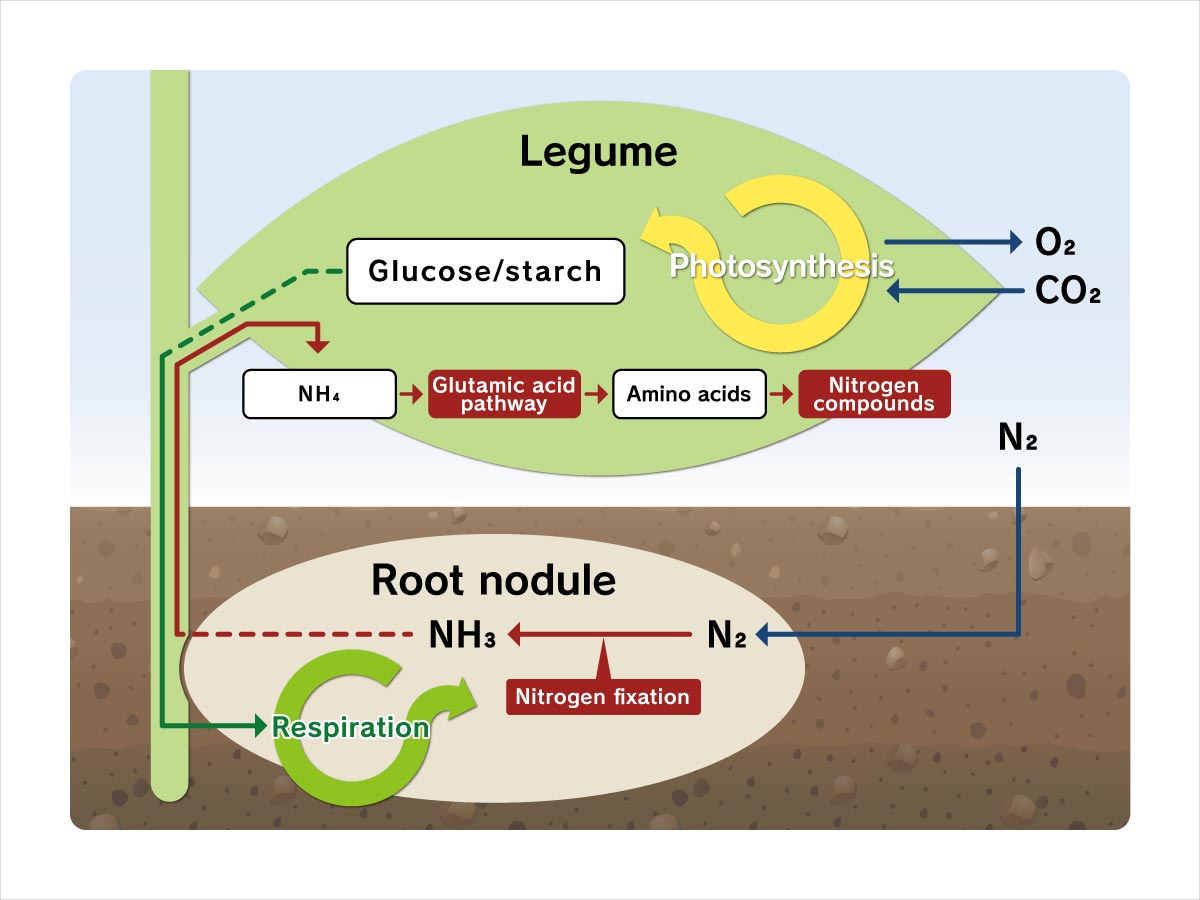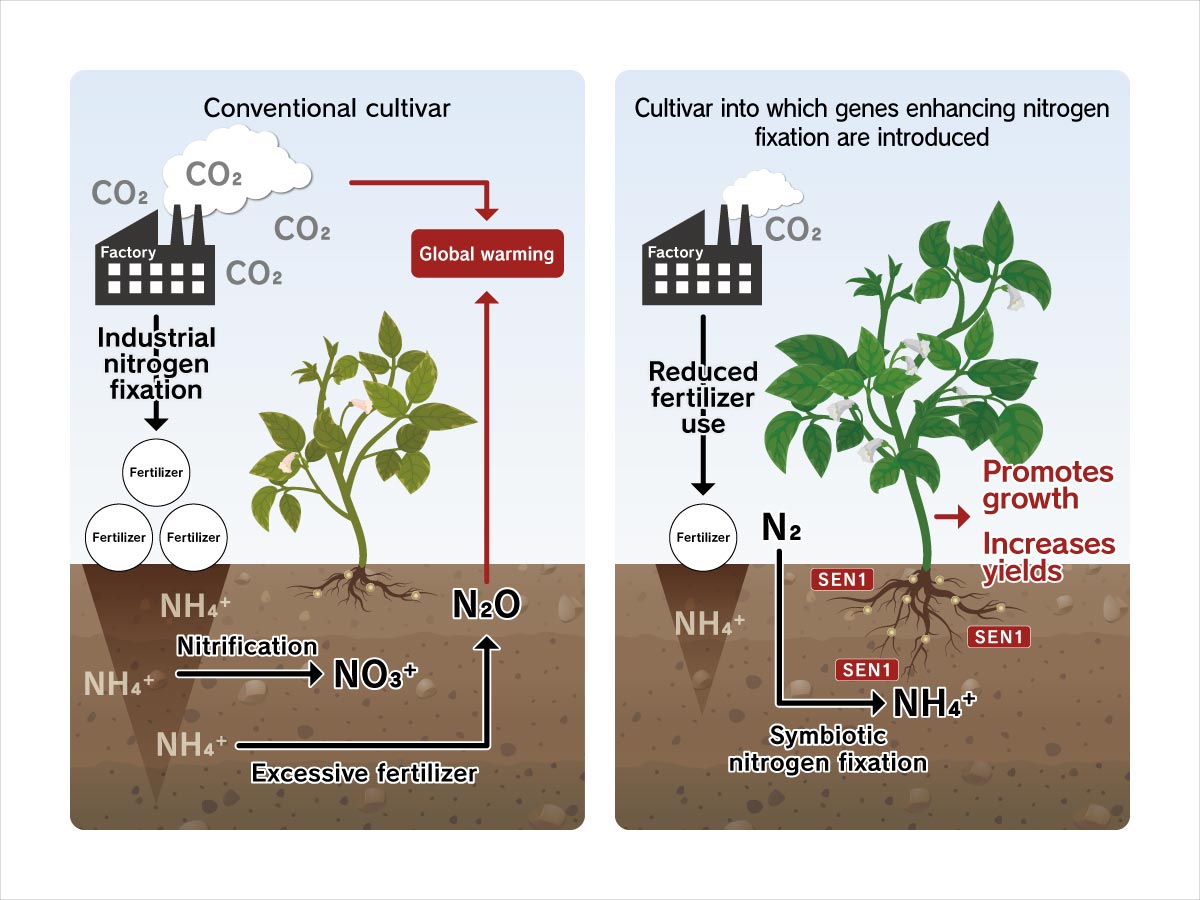Development of soybeans with enhanced nitrogen fixation capacity
for a low-carbon society

Research overview
Development of new soybean varieties with the SEN1 gene:
A major step toward addressing environmental issues The underlying objective of our work is to achieve a low-carbon society.
In our lab, we create and study soybeans capable of enhanced nitrogen fixation, with the ultimate aim of helping achieve a low-carbon society.
■ The key to our work is the SEN1 gene in soybeans.
The synthesis of nitrogen fertilizers used in conventional farming often requires large amounts of energy, which places considerable strain on the environment. Somewhat unexpectedly, legume plants have been shown to be capable of producing nitrogen through symbiosis with rhizobia, which is thought to be important for crop production. However, in practice, the amount of nitrogen produced through this mechanism is not sufficient for crop production.
A gene called SEN1 has proven to be key to creating soybeans capable of enhanced nitrogen fixation.
Research in our lab has demonstrated that SEN1 is essential for nitrogen fixation. We also found that in our plant model, Lotus japonicus, polymorphism of the SEN1 gene affects the plant's nitrogen fixation ability, growth, and seed weight.
Soybeans also have polymorphism in SEN1. We refer to a specific form of this gene as the "Enrei" type SEN1 gene. We have crossed Fukuyutaka, a cultivar that was originally of the Peking type, with the Enrei type SEN1 gene to create our own hybrid, which we have named Fukuyutaka SEN1. Analysis of its properties has revealed that Fukuyutaka SEN1 grows faster, has a greater nitrogen fixation activity, and produces higher yields than the original Fukuyutaka cultivar. In addition, compared with the original Fukuyutaka cultivar, which was grown with a standard amount of fertilizer, Fukuyutaka SEN1 exhibited a similar level of growth with only approximately half the amount of nitrogen fertilizer. These findings suggest that Enrei type SEN1 plants may allow similar soybean yields to be obtained with only half the standard amount of nitrogen fertilizer.
Our analyses of the properties of Fukuyutaka SEN1 are currently ongoing. Going forward, we will intensify our research efforts, investigating aspects such as whether these plants exhibit similar levels of growth in different geographical locations with different climates and/or environments.
■ We are hopeful that such new plant varieties will result in major progress toward addressing environmental issues.
Approximately 90% of the currently available soybean varieties in the world are of the Peking type. Introducing the Enrei type SEN1 gene into these soybean varieties is expected to greatly reduce the amount of nitrogen fertilizers used globally for the production of soybeans.
Legumes have been studied for a long time, and the symbiotic relationships between rhizobia and legumes are well known. However, there have been few instances in which this knowledge has been of practical use in real-life crop production. The agricultural and potential environmental implications of our work regarding new cultivars such as Fukuyutaka SEN1 are a great source of motivation and joy for us as we progress our studies in this regard.
Message
Exploratory experiments showed that Fukuyutaka SEN1 grew at a level similar to that of its original cultivar, even when nitrogen fertilization was reduced by 50%.
SEN1 can be converted to a symbiotic enhanced–nitrogen fixation type in approximately 90% of soybean varieties available worldwide. Further development of this project may help reduce chemical fertilizer use and achieve zero net CO2 emission, which are two of the goals set up under the Strategy for Sustainable Food Systems, or MeaDRI, promoted by the Ministry of Agriculture, Forestry, and Fisheries of Japan.






